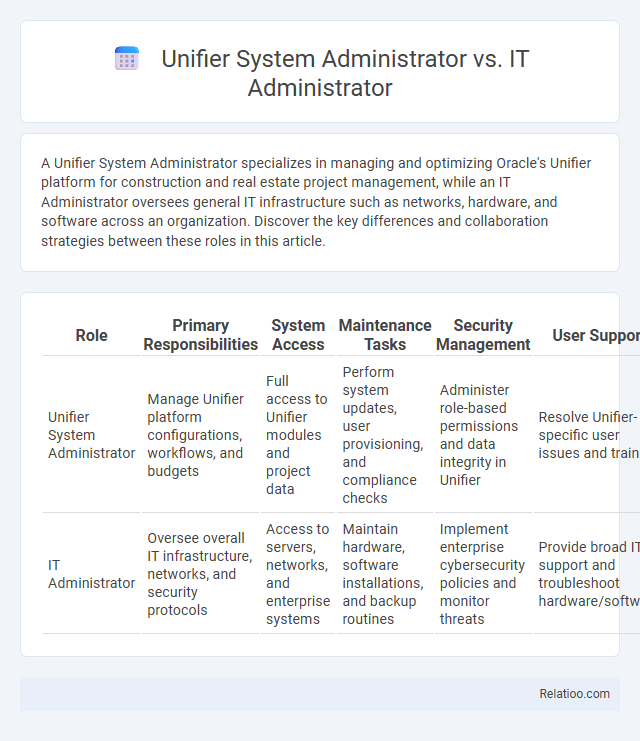A Unifier System Administrator specializes in managing and optimizing Oracle's Unifier platform for construction and real estate project management, while an IT Administrator oversees general IT infrastructure such as networks, hardware, and software across an organization. Discover the key differences and collaboration strategies between these roles in this article.
Table of Comparison
| Role | Primary Responsibilities | System Access | Maintenance Tasks | Security Management | User Support |
|---|---|---|---|---|---|
| Unifier System Administrator | Manage Unifier platform configurations, workflows, and budgets | Full access to Unifier modules and project data | Perform system updates, user provisioning, and compliance checks | Administer role-based permissions and data integrity in Unifier | Resolve Unifier-specific user issues and training |
| IT Administrator | Oversee overall IT infrastructure, networks, and security protocols | Access to servers, networks, and enterprise systems | Maintain hardware, software installations, and backup routines | Implement enterprise cybersecurity policies and monitor threats | Provide broad IT support and troubleshoot hardware/software |
Overview: Unifier System Administrator vs IT Administrator
Unifier System Administrators specialize in managing Oracle's Unifier platform, focusing on configuration, user permissions, workflows, and integration to optimize project lifecycle management. IT Administrators maintain broader organizational IT infrastructure, including network security, hardware, software deployment, and system maintenance across various platforms. Your choice depends on whether you need targeted expertise in Unifier's project management capabilities or comprehensive IT support for enterprise systems.
Core Responsibilities of a Unifier System Administrator
A Unifier System Administrator is responsible for managing and maintaining Oracle Unifier applications, including user access controls, system configuration, and integrations with other enterprise software. Unlike a general IT Administrator who oversees overall IT infrastructure such as networks, servers, and hardware, the Unifier System Administrator focuses specifically on ensuring the stability, performance, and customization of the Unifier platform for project lifecycle management. The role also involves troubleshooting application-specific issues, deploying updates, and collaborating with project teams to optimize workflows and data accuracy within the Unifier environment.
Core Responsibilities of an IT Administrator
An IT Administrator primarily manages the overall IT infrastructure, including network security, system performance, hardware, and software installations, ensuring your organization's technology runs smoothly. Unlike a Unifier System Administrator who specializes in administering Oracle's Unifier platform--overseeing user access, configurations, and platform-specific updates--the IT Administrator handles a broader range of systems and technical support tasks. Your IT Administrator's core responsibilities emphasize maintaining system integrity, troubleshooting issues across multiple platforms, and implementing company-wide IT policies.
Key Skills Required for Unifier System Administrators
Unifier System Administrators require expertise in Oracle Primavera Unifier configuration, workflow management, and integration with enterprise systems, along with strong database administration skills in SQL and Oracle environments. They must possess deep understanding of project management processes, financial controls, and robust troubleshooting capabilities specific to Unifier's modules. Unlike general IT Administrators who focus on broader network, security, and hardware infrastructure, Unifier System Administrators specialize in ensuring seamless operation, customization, and performance optimization of the Unifier platform within project-driven organizations.
Essential Skills for IT Administrators
Unifier System Administrators require specialized knowledge in Oracle Unifier configuration, workflow management, and integration with enterprise systems, enabling them to maintain project controls and cost management effectively. IT Administrators possess broader skills in network infrastructure, security protocols, server management, and user support, ensuring overall IT environment stability and performance. Both roles demand strong problem-solving abilities, proficiency with system monitoring tools, and a solid understanding of database management to optimize application uptime and security.
System Architecture: Unifier vs General IT Systems
Unifier System Administrators specialize in managing Oracle Unifier's integrated project portfolio and cost management architecture, ensuring seamless configuration of its cloud-based or on-premises deployment tailored to construction and engineering industries. IT Administrators oversee general IT systems, including network infrastructure, servers, and enterprise software, focusing on maintaining broad organizational technology environments rather than application-specific platforms. Your choice depends on the need to manage Unifier's specialized architecture with workflows and data integration versus maintaining overall IT system stability and security.
Day-to-Day Tasks Comparison
A Unifier System Administrator primarily manages the configuration, maintenance, and troubleshooting of the Unifier platform, ensuring user roles, permissions, and workflows function smoothly for project controls. An IT Administrator oversees broader infrastructure tasks, including network security, hardware management, and providing technical support across various enterprise systems beyond Unifier. Your daily activities as a Unifier administrator focus on system updates, user support within the application, and maintaining integrations, while IT administrators handle overall system health, network issues, and device management.
Security Roles: Unifier vs IT Administration
Unifier System Administrators specialize in managing user access, configuring security roles, and maintaining compliance within the Unifier platform, ensuring your project data remains secure and controlled. IT Administrators oversee broader network security, including infrastructure, authentication systems, and overall cybersecurity policies that support multiple applications beyond Unifier. Understanding these distinct security roles helps you optimize both application-specific controls and enterprise-wide protection strategies.
Training and Certification Pathways
Unifier System Administrators require specialized training in Oracle Primavera Unifier, focusing on configuring, managing, and supporting the platform, with certifications such as Oracle Primavera Unifier Fundamentals and Advanced Administration. IT Administrators follow broader IT skill development pathways, including network management, cybersecurity, and systems administration certifications like CompTIA, Microsoft, or Cisco credentials. Your choice depends on whether you aim for niche expertise in Unifier or a versatile IT foundation, guiding your training priorities and certification goals accordingly.
Career Prospects and Advancement Opportunities
Unifier System Administrators specialize in managing Oracle's Unifier platform, making them valuable assets for construction and real estate firms seeking expertise in project lifecycle management software. IT Administrators possess a broader skill set managing overall IT infrastructure, offering diverse career advancement across multiple industries and technologies. Your career growth in Unifier roles typically advances through gaining deeper platform expertise and project management, while IT Administrators can expand into roles like network architect or IT director due to their versatile technical knowledge.

Infographic: Unifier System Administrator vs IT Administrator
 relatioo.com
relatioo.com